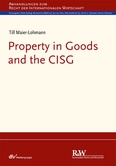558
National laws provide claims that protect the property in the goods. Yet, there are major differences. While some legal systems protect owners by allowing them to (re-)gain possession of the goods, other legal systems protect owners through respective damages claims. As far as a third party raises any of such claims against a party to a CISG contract, the CISG does not preempt the claim. As far as a party to a CISG contract relies on such claims against a third party, the CISG also does not preempt the claim. When either the buyer or the seller to a CISG contract relies on such claims against the contractual partner, the central question is whether the CISG would also 249 provide a claim for the goods or for damages. If the CISG provides for such a claim, it does not preempt national law. This interpretation makes a difference to a general preemption of national law when the claim under the CISG is not enforceable or does not exist for reasons outside the Convention, for example, due to the applicable statute of limitations, or if the claim based on property is also effective vis-à-vis third parties. This rule generally also applies to retention of property clauses: The CISG provides no remedies for the seller to repossess the goods prior to avoidance of contract if the buyer is in possession of them. The agreement on a retention of property clause should not be interpreted to modify the CISG under Article 6 of the CISG in this regard without further indications.


